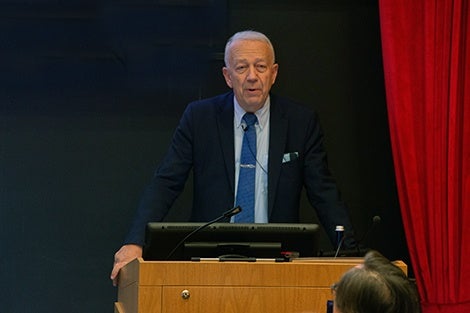November 6, 2018—In the early 1970s, the Finnish province of North Karelia had one of the world’s highest death rates from heart disease. Responding to an appeal from the community, local authorities partnered with the World Health Organization to launch the North Karelia Project, a community-wide effort to change the physical and social environment to promote healthier behaviors and save lives. Project director Pekka Puska, a physician, researcher, and member of the Finnish parliament, recently spoke to a Harvard T.H. Chan School of Public Health audience about the project’s history and its implications for global cardiovascular disease prevention and policy.
Puska delivered the 14th Annual Stare-Hegsted Lecture on October 29 in Kresge G-2. The event, sponsored by the Department of Nutrition, honors two of the department’s founders, Fredrick Stare and D. Mark Hegsted.
The North Karelia Project was launched in 1972 and officially ended 25 years later. While its initial goal was to reduce smoking and saturated fat in the diet, it later added increasing consumption of fruits and vegetables. Behavioral change is complicated, Puska said. It requires more than simply giving people information about healthy behavior—you have to make the environment healthier.
During the project, researchers met with residents and enlisted the help of local groups like hunting clubs and church congregations. They made school lunch programs more nutritious and encouraged local sausage makers to reduce sodium and fat in their products. The helped get legislation passed in the province to ban tobacco advertising and cut dairy subsidies, and promoted local berry farming and cultivation of rapeseed for heart-healthy canola oil.
The project had marked success in reducing smoking and salt and butter consumption, and in getting residents to eat more fruits and vegetables. As a result, deaths from heart disease and other non-communicable diseases (NCDs) declined, and more residents reported on surveys that they felt healthy. Since the start of the project, the population of North Karelia has gained 10 more healthy years of life, Puska said.
The project demonstrates that population-based strategies to influence lifestyle risks are the most cost effective and sustainable way to prevent NCDs and promote healthy aging, Puska said. While personal responsibility is vital for good health, Puska said, public health can help by making it less of a burden to make a healthy choice.
Photo: Nilagia McCoy
